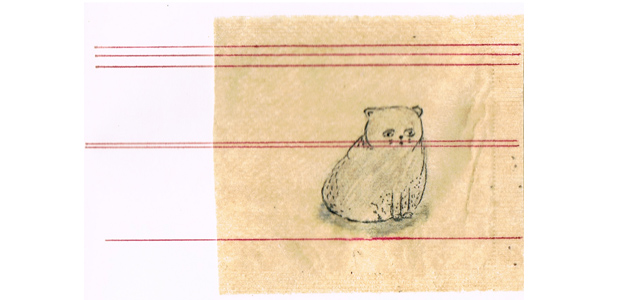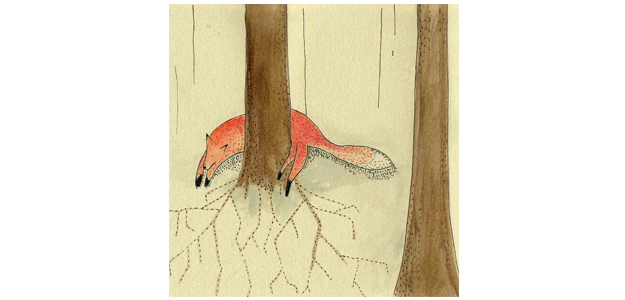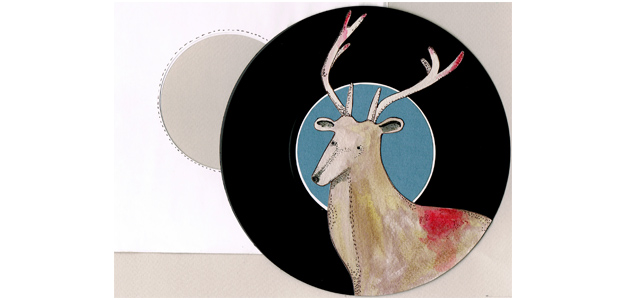
 |
Vol X: Selected PoemsPeter Branson Illustrations by Louise Wright |
Peter Branson has been published by mainstream poetry journals in Britain, USA, Canada, EIRE, Australia and New Zealand, including Acumen, Ambit, Envoi, The London Magazine, Iota, 14, Fire, Frogmore Papers, Interpreter’s House, Poetry Nottingham, Pulsar, Red Ink, South, Writing Magazine, New Writer, Crannog, Raintown Review and Other Poetry. His third collection has been accepted for publication by Salmon Press.
JUMP2CONTENTS
2. Bluebells
4: Blood Rites
5: Moving Day
7: Whatever’s happened to William?
8: George Green
9: The Time the Light Went Out
10: Marriage Lines
11: ‘One for Sorrow ...’
The White Lion, Barthomley, Cheshire
12: Still Life
iii: Illustration: Stag
13: Retrospective
![]()
Nannygoat Lane
Pressed underneath the bank,
wrapped round the text
of an old willow stump
you found the fox,
mealy and mangled
as a beached fur coat
ironed out into
the eager leeching silt.
Two centuries
of fabricated flow
par-filled and dried
that pool above the mill:
one sultry afternoon
whole race broke ranks,
its destiny revised
inside a cloud.
Site where you swam,
scaled heights, acted in dreams -
reel upon reel,
watched floats bitten with hope,
first weeds and grasses
whispered, willow sprouts
now roar out thirty feet
above the ground.
Safe on the shoulders
of your grandfather
tied in by huge bear paws,
tall as the clouds,
you scoured the wooded tracks
for unicorns
with finest ivory
proud on their brows.
![]()
Bluebells
You scale barbed wire above the tired mill race.
A living monument to thrifty times,
gnarled stumps have bolted, arms rainforest-high.
You slalom down, amazed by what you find.
The smell is heaven-sent, heady incense,
an all pervading haze of virgin blue.
Aged eight, you know them from a frayed pub sign,
that day you steal into the Coppice wood.
Spellbound at first, you’ll take some home, you think.
Spring tide at flood, recedes too soon you’ll find,
leaving no trace; soft focussed filigree,
pure azure sea, as viewed through frosting glass.
They bow their heads, as nuns at prayer. Furtive,
you pinch more than one arm can clutch. Once plucked,
each flower a single tear, your sleeves are drenched.
Back home, hands tacky from the wounding sap,
Mum is distraught. “You should have left them there.
They just don’t travel, that’s the truth; can’t last.”
You’ve gleaned that fact. The petals sag as though
they’ve lost all will, their beauty turned to slush,
unspeakable. You’re scared it won’t wash off.
![]()
Attila the Nun
For Mo
Tag she gets lumbered with,
but only in bad dreams
and never to her face.
Trade name is Sister John
the Baptist. Bit on view,
from lower brow to chin,
looks early twentyish.
Her skin is palest pink,
translucent, viewed against
the stark, starch, habit-white,
black-shrouded penguin suit.
Dominican brand rite:
no soiled grey in betweens;
evil and good, dark – light..
Nails perfect sheening health,
eyes gleam like sculpted ice,
frigid, inflexible,
stern as a ruler’s edge,
strict as a Mackintosh
upright, drives sin from kids,
scourges and terrifies.
Children who come to her
suffer, sweet Jesus knows,
except the day you spy
her with an angel (five
years old found crying on
the yard) proud on her knee:
“So beautiful,” she sighs.
![]()

![]()
Blood Rites
Enthralled by sideways-glancing slight-
of-mouth spun off the swimming tongue,
too young to fight, conspire, bound not
to tell what older brothers pass
on to their mates, the time and place
two towns would clash. As lightning melts
an angry August sky, adults
are sheltered, tea’d, indifferent
to Chinese whispers in reverse.
Jukeboxes thunder it’s too late,
a slight that can’t be taken back.
Surreal: black-leather-jacketed
and jeaned young men crowd the film set.
The needle grooved, instinct plugged in,
like stags, they can’t lose face, so size
each other up. Flick knife, cut throat
or chain with some poor sod’s name on
peeps into view. Such danger strong
blood craves: imprint, inbreed, too young
for National Service, eyes ablaze?
Limelight, smoke-snakes, mirrors: false gods
we trust. News reels, tanks rock ‘n’ roll,
guns rattle, bombs shake streets to dust.
![]()
Moving Day
For Aunty Win
Before they reached the bridge she saw the boats,
begged them to stop. She knew the way the breeze
stirred them to life, relaxed then taut again
against their mooring rights. They shoaled small daubs
of light across the wides like herring schools.
She wrote the message carved into the slab
below the massive coping stone. ‘My age’,
she murmured at the number 68 …
‘We had a boat like that after the war.’
They started off back down the telescope’s
cruel eye, concealed behind a bank of cloud;
both hands loud round the handle of her bag;
white knuckle ride, that frightened fey behind
the eyes.
‘She doesn’t know my bloody name!’
he snapped, so angry with the world he’d known
and her. ‘Stop that!’ she warned. ‘Children who swear
deserve a smack.’
Outside himself, he laughed.
‘Perhaps she could have coped?’ his partner asked.
First time they’d found her out he’d thought her drunk.
Eventually they talked the doctor round.
‘Well this is really nice. It’s ages since
we’ve been out in the car’: smile of content,
then warned her husband of the road ahead
and him already more than ten years dead.
![]()
Beneath Red Hill
In Memory of Ed Wright
On holiday, long summer haul, fifteen,
I call on you, tight cobbled space behind
the cinema where Saturdays, aged eight,
from ten-fifteen, I queue for matinees
with mates, clock grainy old B western films.
Blisters my badge of pride, I yearn to be
like you, a working man in your flood prime.
Tarmac and dustcart gangs all take the piss.
I burn brick red. You ride as Tom Mix would.
“Tough sod but fair, Fred Wright,” Jack Jenks has said.
That stroke draws all your pride, word-shy, grid-locked
with concentration and embarrassment.
You know about the embolism, tick
on, borrow time - yet never tell your wife.
Talk tunes to old times you relent, restore
now bristling Lichfield Street, “A mere dirt track
for cart and carriage” where the nouveaux-riche
with Rolls or Bentley, bottle banks at Stoke,
build villas, ride to hounds, rough-shoot, a short
train ride from enterprise, slum-killing smoke.
Low Anglican among massed Catholics,
a martyr to hard drink, I watch him edge
to your graveside. Their holy water words
well-spread, crumbs rap the coffin, like raised fists
on angry doors. “Sound bloke, your Uncle Fred.”
Your education life, your geometry
the perfect squaring of a garage base,
you’ve earned your neighbourly footprint, know how
folks tick; part of your signature, your firm
handshake, the solid ground beneath my feet.
![]()
Whatever’s happened to William?
She reads the signs: an ambulance
arrives to whisk him off, at six-
weeks old found flaccid in his cot,
the cri du chat. Stays touch and go
for weeks. A copper, in Crown Court,
he gets away with it - and she
gives him the benefit. You help,
agree to mother Will while things
got sorted out. Most afternoons,
all supervised, your sister trawls
cold spite into your home, Still not
quite cold that addled cuckoo’s egg:
You store soured thoughts inside a box
and scrawl a ‘Do not open’ sign.
Guilt churns them in its mauling grip.
The trust invested pens her fast
till told she’ll not get William back
while he lives in. That’s when she snaps,
fast-forwards things, moves on. Dark stuff
comes out: first wife bludgeoned, off beat;
lost bouts of anger management;
he only shook the kid, he claims,
in panic when it fell into
a fit; green fractures partly healed.
Magicians pull white rabbits out,
staunch tidal bleeds, brain more or less
intact, but fail to conjure back
his sight. These days, aged eight, rage maps
his father’s direful fingerprint.
He’s hapless as a hobbled horse
locked in his rocking stall, reined by
deep shadow-lands, perpetual night.
Braille wise beyond his age, he dreams
in tongues, raps time through palsied feet.
![]()

![]()
George Green
‘What means these ridiculous monstrosities in the court of cloisters?’
(St Bernard of Clairvaux, 1125).
‘The symbols are ingrained in the psyche … since the dawn of human existence.’
(G. R. Varner).
‘The Green Man’: term coined by prominent folklorist, Lady Raglan, circa 1939.
Shaped from heart wood, hard stone, no figment, flesh
and blood transformed by low-born artisans,
these fiendishly-depraved eyesores, symbols
employed to decorate high corbel, roof
boss, font, bench-end and startled misericorde,
kept fussy church officials ignorant
of what they represent, the living sap
within the gnarled dark root, those furtive eyes
above old chapel doors, the dancing men
and stag-horns peeping out from altar screens.
“The Reverend Griffith took me to his church,
showed me this curiosity in oak,
with leaves and branches sprouting from the mouth
and ears, entirely smothering the face.”
Jack in the Green’s abroad. No begging game
by lean black chimney sweeps in garish clothes,
led by a hobby horse; wild kettle drums,
whistles and frying pans, this one’s for real.
Where branches arch beyond the grazing height,
you’ll find his signature. D’you understand?
Those haunted eyes, gaunt cheeks and knotting brows:
there’s something present here we’ve never known
yet recognise, an energy, a fugue,
the spirit present in each cell of plants
we eat, flowers we smell, the air we breathe.
These days George Green’s despondent, gaunt, afraid
he lacks the strength and cunning to redeem,
restore our baneful toxic fingerprint;
no breathing space to beat retreat, for seed
to relocate, mature, habituate.
![]()
The Time the Light Went Out
How did the Dark Age come?
The power wound down.
There’d been some temporary rationings
but this time they’d been warned it was for good.
Cookers lay barren, central heating stalled
and kettles lacked the will to mash the tea;
no candles left to burn, light chased the sun.
Lids flipped, big-time; weird portents, false sunsets.
The web and mobile culled, churches swelled up -
‘All day confessionals’. They soon got used
to life without TV; had radio,
just BBC and certain hours per day:
‘Don’t panic. It will do more harm than good’.
Then what?
Home freezers stank. Cards idle, cash
points blunt - rioting: ‘All looters will be shot!’
Shops glass-eyed blanks and supermarket shelves
exposed, how people change … They hid what food
they’d got. Pet cats and dogs soon disappeared.
Gunfire was circumspect, mostly at night:
can’t live on love. Tap water was unsound;
rubbish and sewage stacked. With pharmacies
racked dry, they dropped like pins: Death rock ‘n’ rolled.
The mood turned desperate: a boy was birched
for stealing cabbage leaves; black marketeers
and deviants were scourged and strung from trees.
Who lived and died?
Folk tried to flee the towns
and cities. All known exits batten-downed
and booby-trapped, a few got out on foot
before the walls of razor wire went up.
From then escape well nigh impossible,
Badlands we shun today, rank with hindsight,
became death camps. Nine out of ten expired:
many gave up the ghost. But where we are,
farm stuff long commandeered, some held their breath:
with notice of old ways you kept alive.
Gamekeeper, poacher, new age traveller
survived The Cleansings; gypsies dined like kings.
![]()
Marriage Lines
She would have made
a fine ship’s carpenter,
reliable, discreet,
confined for months in clamped
uncompromising stench
on long-haul voyages
to other worlds.
Main task, use eyes,
ears, feel, experience
to monitor
those vital signs,
the slow heartbeat
of breathing hull,
rudder and mast.
Fearful to rock the boat,
she bends before
her demon captain’s will,
splicing repairs,
re-caulking planks,
treading sea shells
to stave disaster off.
Gentled but unfulfilled
(No fiction this),
she feigns desire,
feels duty-bound,
submission, flattery,
respect. So who are you
to criticise?
![]()
‘One for Sorrow ...’
The White Lion, Barthomley, Cheshire
Stiff drink, blue sky, autumn dancing outside,
you don’t know what to say to him or how.
Eventually you ask about his kids,
dry ground you think. Face drawn and pale, washed out,
the only colour inked inside the deep
cracks of his parchment brow, you wonder what’s
beneath the worn straw hat you’ve never seen
before, relic of seaside jaunts, you guess.
He chats more freely now, like his old self,
warms up, rails on about the government,
recession, student debt. You’re torn, surprised
to find him here, tired duffle coat he filled
for twenty years, so frail, stooped over, like
a wraith; last look at his old haunts perhaps;
this ancient pub, oak-boned, magpie, foot-worn,
honed by four centuries of well-spent lives.
The church bell opposite tells one o’ clock.
You clock his long progression to the door:
seems to spend ages on one step, hard graft,
as if his shoes are battened to the floor,
each move a distant memory he can’t
recall. You’ve waved goodbye but he’s still there.
![]()
Still Life
Back of beyond, great shambling farmhouse, grand
for kids - and haunted too, the weirdest stuff:
a baby crying she can’t reach; one night
in bed (they’ve separate rooms by then), a man
mutters, in Welsh, “What are you doing here?”
She just can’t settle after that. Gets up
to brew strong tea and fuss her old black cat.
Nails scratch on walls, footfalls, lift of a latch.
Once, in the kitchen, she is fondled from
behind when Dave has gone. After the wake,
under the wooden hill, heath etched beyond,
so quiet (they spurned TV), and him at work,
she’s too much space to think. Each time she tries
to feed her small songbirds, the hawk will kill.
She poured herself on her career. Too late,
several miscarriages, one blighted, forced
to terminate, then carry it for weeks
stone dead, a kind of motherhood. Time-locked,
she holds it for the photo-snap and soothes
soft-focus wailing no one else can hear.
Three years have spent and still no sign above
the tiny grave. Few people call. She blanks
her sisters when they phone. Used to be close,
now both have kids. Her sadness manifest
in long and lonely hikes at crack of light,
she’s desperate for endorphin hits, in pain,
unhinged, stumbling towards, running away,
to sate an emptiness she can’t contain.
She talks of evil forces deep inside,
“God’s punishment, malevolence big time.”
![]()

![]()
Retrospective
In Breughel’s masterpiece, Joseph and spouse
arrive at Bethlehem to pay their dues,
no hint, before celebrity kicks in,
they’re more significant than other folk
out there, soused by the snow. This makes no sense
in geography nor when bowled over by
two thousand years’ remorseless spin. Point is
it’s what he liked to do – and understood.
Could smug contemporaries at Eton sense
the nascent Orwell in young Eric Blair?
Those who knew Newton as a problem child,
had they an inkling what he’d grow into?
With hindsight, anything is possible.
In later years, no doubt, they drown in clues.




